Movie Review – Fury (2014)
Prototypical modern war film, Fury instigates sound and… er, fury when it should focus more on character. In place of depth and human insight, are shallow, often trite war cliches which play out against a backdrop of carnage and horror. Competently produced, and well acted by the cast (particularly Pitt and Lerman), Fury has the problem of not lingering in the mind long after being seen. It’s good enough, just not great.
– Summary –
Director : David Ayer
Year Of Release : 2014
Principal Cast : Brad Pitt, Logan Lerman, Shia LaBeouf, Michael Pena, Jon Bernthal, Jason Isaacs, Scott Eastwood, Xavier Samuel, Brad William Henke, Anamaria Marinca, Alicia Von Rittberg, Eugenia Kuzmina.
Approx Running Time : 134 Minutes
Synopsis: A group of American tank operators fight against the Nazis in World War II.
What we think : Prototypical modern war film, Fury instigates sound and… er, fury when it should focus more on character. In place of depth and human insight, are shallow, often trite war cliches which play out against a backdrop of carnage and horror. Competently produced, and well acted by the cast (particularly Pitt and Lerman), Fury has the problem of not lingering in the mind long after being seen. It’s good enough, just not great.
**********************
Fury stands as a decent example of a war film, if not a particularly revelatory one. Modern depictions of war films changed forever with Saving Private Ryan’s violent, kinetic, harrowing visuals and masculinity, a style echoed in seemingly every film and television show to depict war (at least real wars, not the fictional ones) since. Fury is no exception, although this shouldn’t be seen as a negative. What the film is, however, is a more character-driven study of the effects of war thrown into a “man in a box” scenario that tries its best to depict the fragility (and strength) of the human soul in times of crisis. Ayer, best known for his films End of Watch and the Arnie-thriller Sabotage, brings his keen-edged visual tenacity to what could simply be yet another war-a-thon set during World War II, while leading actor Brad Pitt steers the relatively younger on-screen crew of the titular tank, named “Fury” by the residents, through a fairly effective “boys into men” narrative that ultimately isn’t as fresh as it strives to be, yet isn’t a total wash.
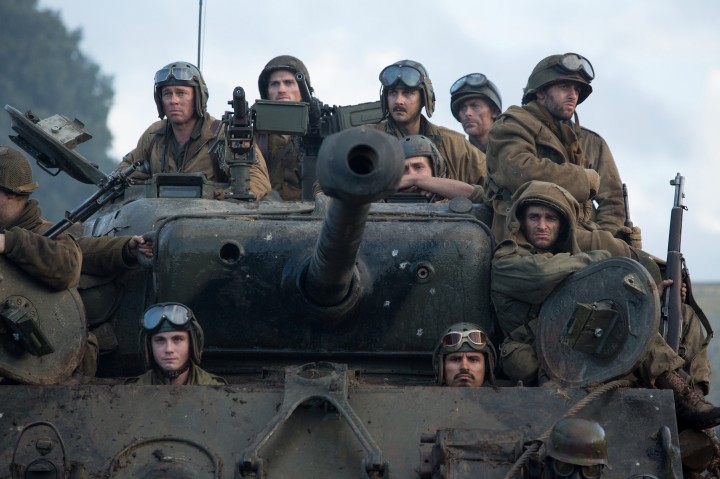
It is nearing the end of WWII. The Allies are making their final push into Nazi Germany. US Army Staff Sergeant Don Collier (Brad Pitt) leads a team of tank operators into battle inside their war machine, nicknamed Fury. With him are Boyd Swan (Shia LaBeouf), Corporal Garcia (Michael Pena), and Pfc Grady Travis (Jon Bernthal), who are all world weary and scarred from their time serving in World War II. After their assistant gunner/driver is killed, Fury is allocated a new member of the crew, typing pool graduate Norman Ellison (Logan Lerman), who is neither trained nor prepared for the terror of combat. The tank group is ordered back into battle, to hold the lines against a multitude of Nazi forces – Collier directs the crew to obliterate as many Germans as they can. As the Germans march unaware upon the supply line to the Allied front, Don and his crew must make a lone stand against the enemy to prevent disaster.
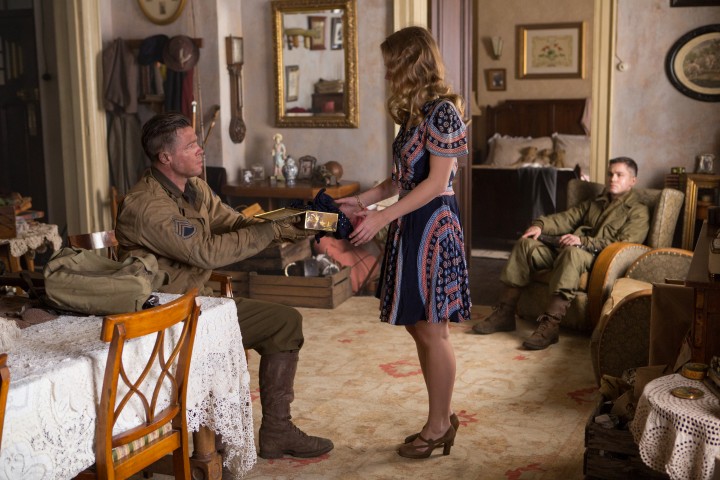
War is hell. Fury is problematic on several levels. On the one hand, it desperately wants to be a solemn, graphic account of men facing the horrors of war in one of the bloodiest conflicts this planet has ever seen. In doing so, it steps through any number of war film cliches you like to mention, failing to really set itself up as a unique experience. On the other hand, Fury’s deftly charismatic cast, and stunning production design, go a long way in making up for the shallowness of character or the generic scripting which follows the film into an early exit. As ambivalent as I am to the modern war film, which is typically personified by the juddery, shudder-frame lensing and monotone, desaturated color palette (of which Fury is a prime example of, with virtually zero color to be found anywhere here), Fury’s predisposition to constant carnage and eviscerating conflagrations means the audience’s investment in any of the characters is somewhat hard to manage.
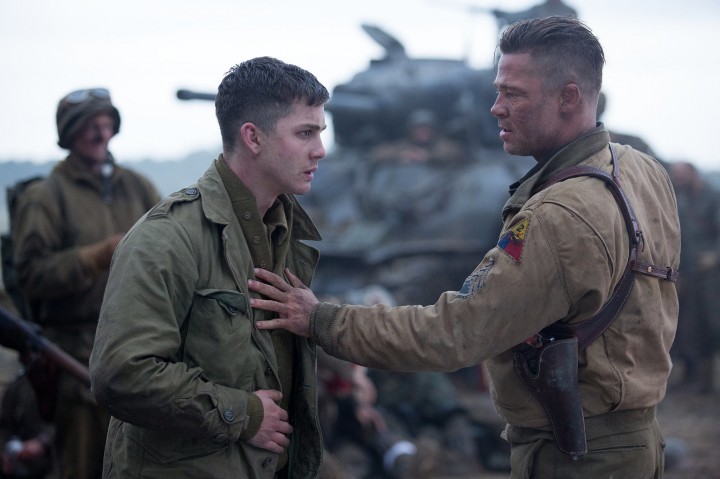
War is hell. Director David Ayer gives his war film a decisively violent sheen. The opening shot, with a German soldier riding a horse through a battlefield littered with the corpses of vehicles, animals and soldiers, before meeting an untimely end, is perhaps Ayer’s way of getting his audience into the mindset to watch this film. It’s melancholy, almost a gut-punch of sharp, brutal violence; knowing war is hell is one thing, showing it so persistently, so graphically, is another. Part of me began to form the opinion that Ayer’s overt use of graphic violence and lurking, almost pornographic camerawork on the horrors of man’s inhumanity – dissolving corpses of soldiers being crushed by tank tracks, heads being blown apart, the way in which life is of almost no value whatsoever – became less about shock value, and wandered into a sense of gleeful exploration of depravity. That’s not to say it should lessen the impact of such material, because I’m sure things were exactly like this in the heat of battle, but the constant, wearying depiction of it began to wear itself out well before the film came to an end. A good war film should never hold back on the violence, but it should hold something back to invoke shock, rage or some other emotional response. The white noise of battle becomes a deafening roar that most will tune out by the end.
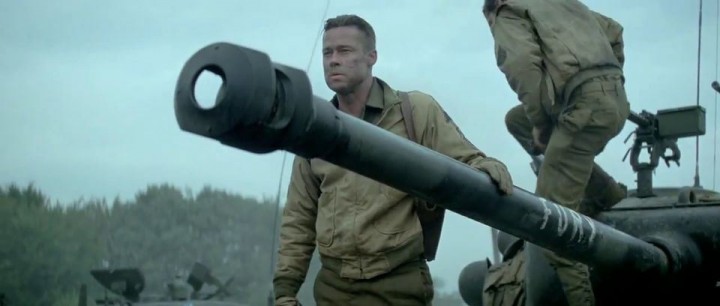
War is hell. The script, by Ayer, isn’t what I’d call particularly revealing; it’s your basic “new fish” throw in with the “old stagers” and forced to confront the horror of war story, and as the audience, we’re expected to come along for the ride on that journey. It’s the kind of story we’ve seen before, not only in war films, and as much as I’d like to say Ayer brought something new to the genre, or managed to eke out some kind of new slant to show us about how shitty war truly is, he can’t. It’s a screenplay I’d lay in the box marked “perfunctory”; that is, it does what it needs to and not a lot more. Character, aside from Pitt’s and Lermans’, are generic and/or poorly conceived, although the fact that almost every war film in history has played in this sandbox more than once perhaps leaves little room for new material in this instance. Yet, even working with well known War Movie tropes, Ayer can’t muster a decent ensemble of characters. Shia LaBeouf’s Boyd is the resident Christian, willing to pray and lead the men through whatever God’s will might be that day. Michael Pena is a weirdly silent, softly spoken Mexican fighting for the USA, while Jon Bernthal is the “one who’s spirit is broken and he’s totally batshit crazy at having to remain in the war”. Bernthal’s slack-jawed performance actually reminded me of Tim Blake Nelson’s role in O Brother Where Art Thou, only here it’s more serious.
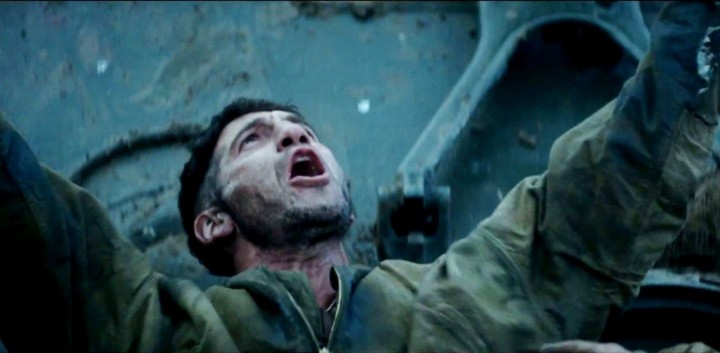
War is hell. The film is salvaged somewhat by excellent performances by Brad Pitt and Logan Lerman. Pitt struggles a little with the “weary, unafraid commander” role, a role similar in tone to Tom Hanks’ in Private Ryan, only without the lost soul; he’s the one who keeps his men fighting on, wanting to give up himself but knowing his country and his men need him to keep going. A momentary “breakdown” scene occurs early in the film approximates Hanks’ similar moment in Ryan, only Pitt’s attempt comes too early to pay off in a significant emotional way – we don’t really know the character or appreciate his struggles, and already we’re asked to empathize with his emotional free-fall? I didn’t quite feel it. Yet, Pitt’s solid performance throughout the movie is one of Fury’s strongest elements. He’s aided by Logan Lerman, as wide-eyed Norman, the generic “new fish” role which asks Lerman to emote genuine horror and an inner strength of will that vanishes relatively quickly once the tank shells start flying. Lerman’s a competent actor (he was terrific in The Perks Of Being A Wallflower) and he certainly gives his all here, but the character’s so predictable and old-hat, he doesn’t have much to sink his teeth into that we haven’t seen before a hundred times. For what he does have, though, he certainly isn’t afraid of making the role his own, and elevates the material as best he can.
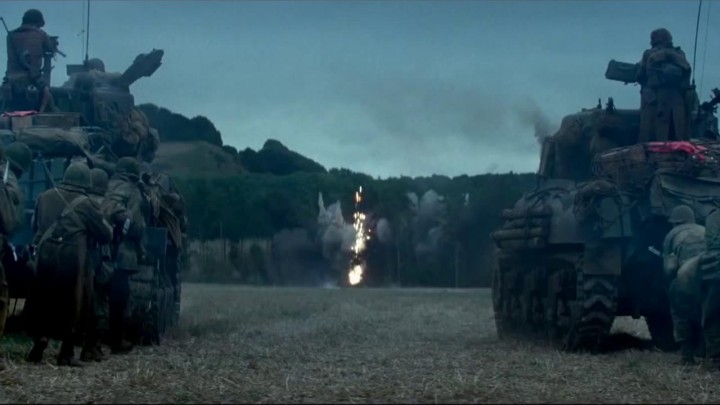
War sucks, right? Perhaps Fury’s biggest achievement is its production design – with one huge caveat – that pulls the viewer into the trenches and battlefields of Germany in WWII. The scope of the film is both intimate and epic: the landscape of German warfare is horrifying, with rending flesh accompanying concussive threshing of sodden earth and shredded metal. The battles depicted are utterly brutal, faultless in almost every regard with specific attention to the way in which the human body can be mutilated by artillery and ordinance. The oppressive color scheme and Ayer’s decision to shoot a lot of the final act in dim light and/or darkness, does make some of what happens in the latter stages of the film a little hard to make out, but confusion within a war film is almost an expectation instead of an accident. The fact that the color scheme also makes it difficult to determine ally from enemy in the heat of battle is particularly interesting, and one wonders if friendly fire was a common occurrence in these times of trouble.
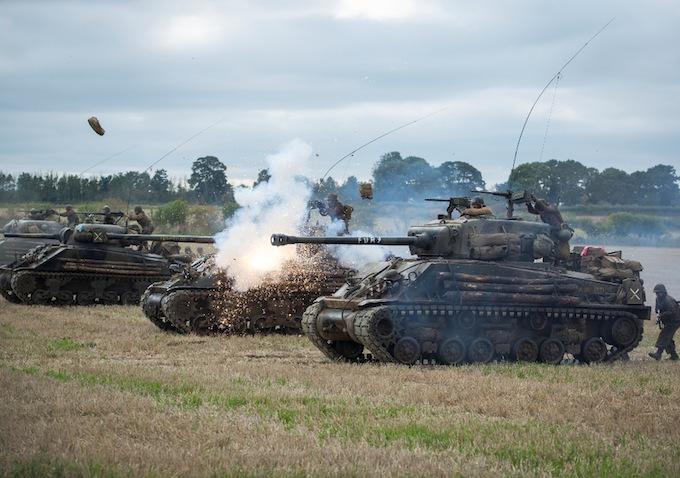
The single biggest caveat to the film’s production is the use of tracer rounds within the battle sequences. The tracers are supposed to allow the shooters to know exactly where they’re firing, but Ayer’s decision to make these rounds all manner of different colors ends up looking like a Star Wars movie than a WWII movie. It may or may not be historically accurate – I’m no war expert – but from a visual point of view, it pulled me out of the movie. I actually giggled the first time it happened, because I half expected the Millennium Falcon to drop down and blast a German tank to bits instead. I get that people in the audience need to know what’s going on, and who is firing upon whom, but the barrage of red, yellow, blue and orange tracer rounds was a little too obsequious considering the tone of the remainder of the movie. They looked like laser beams.
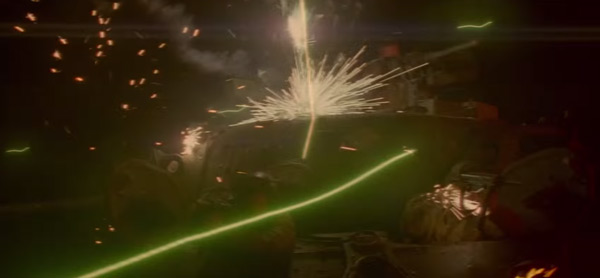
Fury is a solidly made movie. It’s a high water mark for tank warfare on celluloid, because I don’t think the sheer terror of tank warfare has ever been portrayed in this manner. But as a war film, lumped together with the likes of Private Ryan, Band Of Brothers, Black Hawk Down and many others, it tends to become lost in the jumble. There’s nothing that made me jump up and exclaim some manner of artistic brilliance. Yeah, there’s graphic violence, there’s brave soldiers fighting to the last, there’s evil Nazi soldiers (and a good one in there too) and a mid-point scene where a couple of nice young German women remind the men about the good in the world, but it’s all a cliched blitzkrieg of explosions, gunfire and male bonding inside a tin-can of death. Fury’s problems are many, most of which revolve around a sense of “been there, done that,” but it’s well made and largely well acted, even if the characters don’t broach new material and the plot seems a little reminiscent of… well, every other war movie.


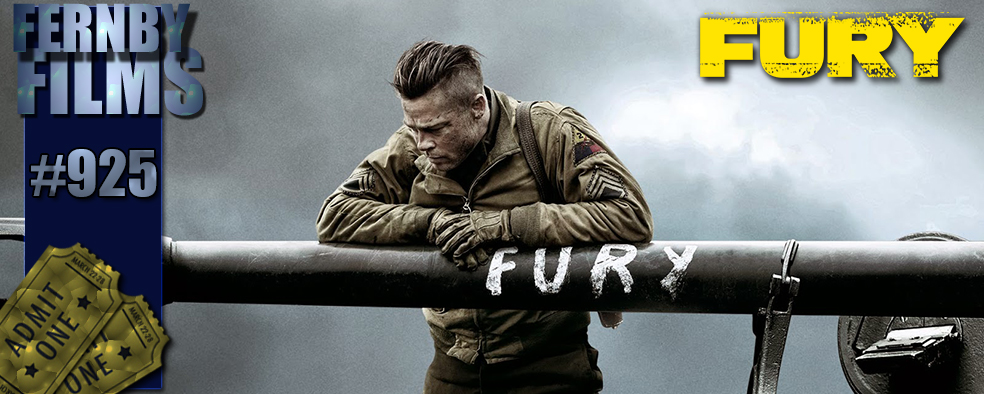
 Fury (2014)
Fury (2014) Fury (2014)
Fury (2014)







Enjoyed this one slightly more than you did
I was a bit harsh on this one in retrospect, but i stand by what I said. I expect more from a war film. Fury felt flat.
I'm not big into war films Rodney, as they tend to be too violent for me. I'm more interested in ones that focuses more on the psychological aspects, like The Thin Red Line.
My recent post 2014 Recap: Top 10 Best + 5 Worst Movies of the Year
You won't find much joy here then, Ruth. This film is entirely about the violence, and too little on the psychological aspects of combat. I hated Thin Red Line (a well known fact to readers here!) but I did appreciate that it tried to do something different than simply shoot-em-up.
Sounds kind of like every other modern war film. The only modern war film that is any different than Saving Private Ryan was Inglorious Bastards. That one was at least different, and, hey, it had Brad Pitt, too. The Star Wars thing took me completely off guard. Now, I have to watch this movie. Can we do a fan-edit where we replace the music with the Star Wars soundtrack?
I'm sure if somebody did, it'd be a damn sight better than this movie.
The force is strong in this tank, Luke.